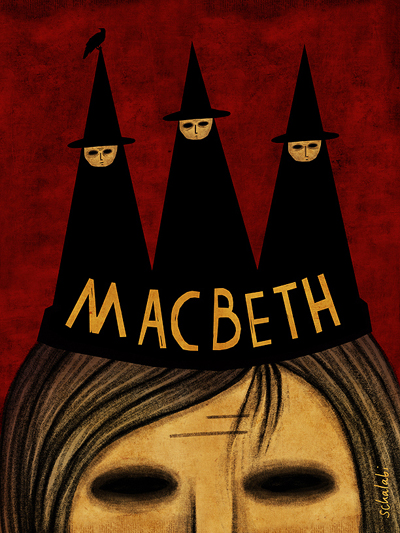*This lesson plan is still in the works.*
Thematic Unit: Fate vs. Free Will — Lesson Plan Overview
Macbeth Study Guides
Film used: Patrick Stewart version (PBS)
- What role, if any, does fate have in our lives?
- Are good people capable of doing terrible things?
- How far would you go to have power?
Historical Background
- End of 16th and beginning of 17th century - Witchcraft was a hot topic.
- 1597 - James I hunted down witches and wrote a book about it (Daemonolgie).
- 1605 - Gunpowder Plot (think: Guy Fawks and V for Vendetta)
Shakespeare writes Macbeth during this time (not a coincident). The themes, ideas, and situations that occur in Macbeth were consciously and deliberately included by Shakespeare to create a play that was relevant and current.

Themes Encountered in Macbeth
Fate vs. free will
Destiny
Good vs. evil (and how is it determined?)
Things are not what they seem
Power corrupts
Blind ambition
Superstition affects human behavior
Mental illness
Also look at:
Mental illness
Pairing Texts
"Rules of the Game" (Amy Tans) -
"Ambition: Why Some People Are Most Likely To Succeed" (Time)
"Historians and Scholars Produce New Picture of Witches and WitchHunts, but Questions Remain"
"Historians and Scholars Produce New Picture of Witches and WitchHunts, but Questions Remain"
The Witch of Blackbird Pond - how superstition affects human behavior.
Blind Ambitions: The White House Years (John Dean) - ambition
All the King's Men (Robert Penn Warren) - ambition
Lord of the Flies - power, ambition, human nature
Beautiful Creatures by Kami Garcia and Margaret Stohl (modern YA novel)
Beautiful Creatures by Kami Garcia and Margaret Stohl (modern YA novel)
Also look at:
Power couples in history
Health consequences of extreme guilt
"Nearly all men can stand adversity, but if you want to test a man's character, give him power." - Abraham Lincoln (1809-1865)
- What is Lincoln suggesting about the relationship between character and power?
- What is he suggesting about the importance of "adversity?"
Journals
Discussion Questions by Act
ACT 5
3-4- In what ways has Lady Macbeth turned into a dynamic character?
- How does Macbeth’s order; “Let every soldier hew him down a bough/ And bear’t before him. Thereby shall we shadow/ The numbers of our host, and make discovery/ Err in report of us,” recall the prophecy made to Macbeth?
- Why doesn’t Macbeth meet his enemies in battle, rather than let them lay siege to his castle?
5-6
- In what ways does Act 5, Scenes 5 and 6 foreshadow the ending of the play?
- “Things bad begun make strong themselves ill” --> How is this theme true in Macbeth’s life?
- Macbeth’s response to hearing a scream from within the castle is best explained in lines 10- 16. Interpret these lines.
- Why are the women screaming?
- Explain Macbeth’s reactions when he hears Birnam Wood is moving toward Dunsinane.
- How does Macbeth react to his wife’s death? Why is this significant?
7-8
- How can we analyze the resolution in the play to draw conclusions about Shakespeare’s purpose in Macbeth?
- Think of a fictional or real life character whose life parallels Macbeth’s in some way
- Why is it so easy for Malcolm and Slward to enter Macbeth’s castle? Why is Macbeth somewhat relieved after he kills young Slward?
- When Macbeth and Macduff finally meet on the battlefield, Macbeth says to Macduff; “But get thee back! My soul is too much changed? With blood of thine already.” To what is Macbeth referring?
- How does Macduff crush Macbeth’s final hope of winning the battle?
- Explain Macbeth’s lines and what they say about his character. “Though Birnam Wood be come to Dunsinane./ And though opposed, being of no woman born, yet I will try the last./ Before my body/ I throw warlike shield./ Lay on Macduff, And damned be him that first cries, Hold, enough!”
Sound and
Symbols in Soliloquy *
Literary Terms
Covered: Soliloquy, Symbolism, Staging/Acting Section of Play: (5.5.20-31)
Speaker: Macbeth
Speaker: Macbeth
Writing
Prompt: One of the most well known soliloquies in all of Shakespeare’s plays is
the one delivered by Macbeth in Act 5 after learning of Lady Macbeth’s death
(5.5.20-31).
Who is Macbeth talking to (himself, the audience, Seyton)? What is Macbeth saying in this speech? What is Macbeth’s state of mind at this point in the play? What is the symbolism of the candle?
Who is Macbeth talking to (himself, the audience, Seyton)? What is Macbeth saying in this speech? What is Macbeth’s state of mind at this point in the play? What is the symbolism of the candle?
Activity: How
would you suggest an actor deliver these lines (tone of voice, physical
movement, etc.)? Break the class up into groups. Each group will choose an
“actor.” The rest of the students will direct the actor. Each group will be
given an expression (angry, sad, defeated) that their actor will convey as they
perform this part for the class.
Which way was most effective?
Which way was most effective?
Writing
Prompt: (Folger Post-Performance 6) What implications does the play have for
today’s world where tyrants and dictators cause chaos in their countries? Think
of ways a director could “politicize” a production (use of crowd scenes,
uniforms, national flags, etc.).
http://www.achieve.org/files/EnglishIIIUnit3SampleModuleMacbeth_1.pdf
http://mnliteracy.org/sites/default/files/macbeth_curriculum.pdf
http://www.shakespeare-online.com/plays/macbeth/soliloquies/diedhereafteranalysis.html
http://www.shakespeare-navigators.com/macbeth/BBCiLessonPlans.html
http://downloads.bbc.co.uk/schools/teachers/shakespeare_unlocked/macbeth.pdf
http://www.lct.org/media/filer_public/b1/9c/b19cb77d-63c1-4a35-a8cb-8ca7c9ba358d/shakespearesmacbethstudyguide.pdf
http://learning.blogs.nytimes.com/2010/08/02/teaching-shakespeare-with-the-new-york-times/
http://learning.blogs.nytimes.com/2010/08/02/teaching-shakespeare-with-the-new-york-times/

No comments:
Post a Comment
Please only post helpful comments (i.e. questions, suggestions, appreciation, ect.). Any comments not beneficial to the lesson ideas or discussion will be deleted.